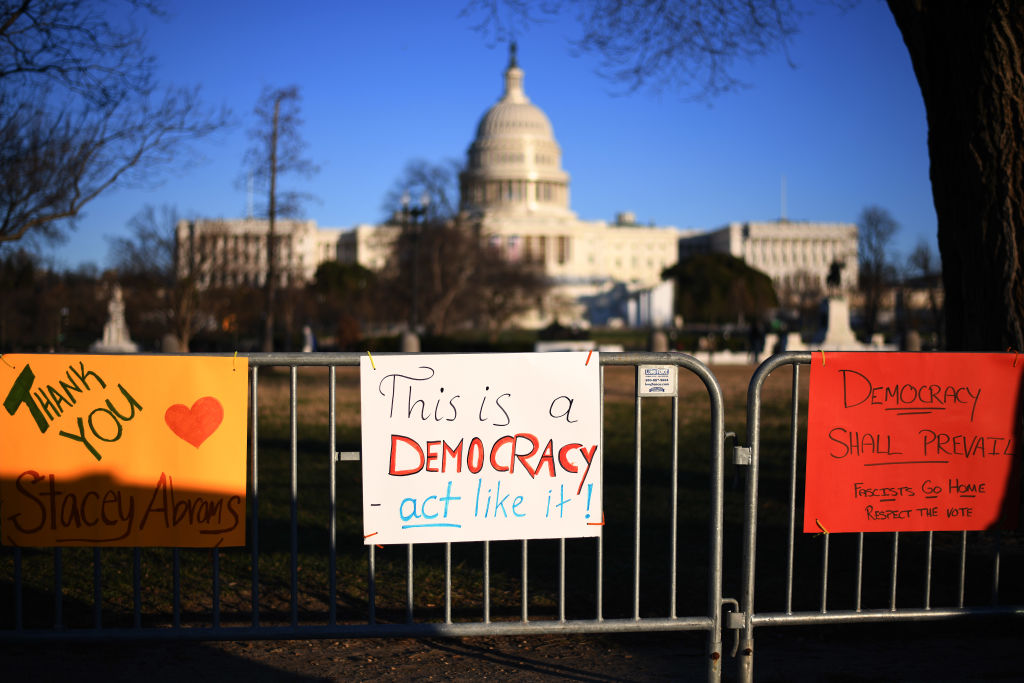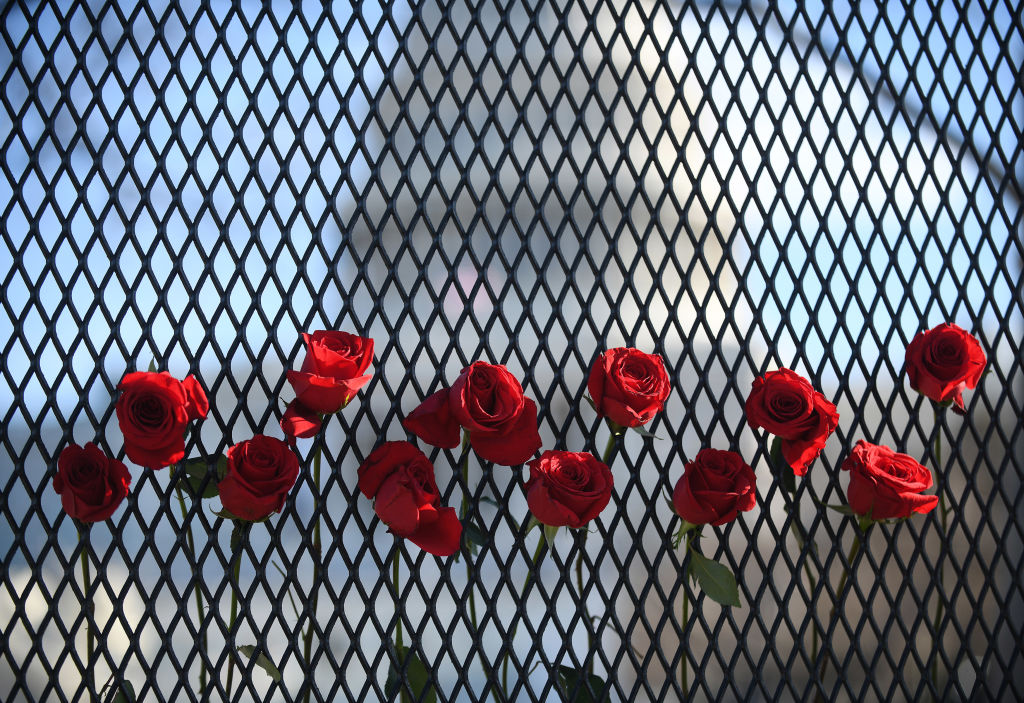
“Turkey invites all parties in US to use moderation, common sense to overcome this domestic political crisis,” tweeted Turkey’s Anadolu news agency as the Capitol siege played out on television screens across the world. It wasn’t the only one savoring the schadenfreude.
Wisecracks like “Protesters storm parliament in this former British colony” flew thick and fast worldwide, highlighting the irony of a putsch in a country that sees itself as the global gatekeeper of democratic propriety. It didn’t help that the legislative stronghold of what is still the world’s only superpower fell to a crowd of rioters, many animated by kooky conspiracy theories of satanic deep states run by blood-drinking pedophiles.
In India, which makes common cause with the U.S. for supposedly shared democratic values, a much-circulated tweet read, “Wow! Waking up to the news that United States of America has become Uttar Pradesh,” referring to the lawless north Indian state ruled by a Hindu supremacist with a record of rioting and rabble rousing against Muslims. Sarcasm ruled the airwaves. Talking heads on television waxed eloquent on the stability of the Indian democratic system and what the U.S. could learn from India’s unbroken record of peaceful transfers of power for seven decades (longer than the 55 years America has had as a multiracial democracy since the passing of the Voting Rights Act). Newspaper headlines cut to the heart of the tumult in sharp banner headlines. The Times of India ran with ‘Coup Klux Klan’.
Read more: ‘They’re Jumping Ship.’ Inside the Lonely End of the Trump Presidency
Never one to waste a good crisis, Prime Minister Narendra Modi tweeted to his 64.7 million followers: “Distressed to see news about rioting and violence in Washington DC. Orderly and peaceful transfer of power must continue. The democratic process cannot be allowed to be subverted through unlawful protests.”
Modi’s statesman-like message was multi-purpose. It put some distance between himself and Donald Trump, whose re-election Modi had openly endorsed. The tweet, washing his hands of a lost cause, also worked to de-legitimize a peaceful, months-long farmers’ protest in India by obliquely equating it with the violence in Washington. Most importantly, it was Modi’s way of breaking out of the Trump-Erdogan-Putin-Orban league that he finds himself in these days as India’s democratic credentials continue to wither.
In its Democracy Report 2020, Sweden’s V-Dem Institute lists India among the top 10 fastest autocratizing countries, “on the verge of losing its status as a democracy.” Modi’s ruling Hindu nationalist Bharatiya Janata Party (BJP) now scores as high on its “illiberalism index” as the ruling parties of Turkey, Hungary and Poland.
Hungary lost its status as democracy in 2018 and Turkey in 2014. As the global rise of populist demagogues in these countries show, “unlawful protests” are not how democratic processes are “subverted,” as Modi would have us believe. That comes about by weakening and destroying democratic institutions from within. By silent institutional capture, rather than rowdy marches on legislatures. By surgical strikes, rather than cavalry charges. If anything, the attack on America’s symbol of democracy was an act of frustration at the failure to subvert its substance.

Why American Democracy Will Survive
The storming of the Capitol occasions introspection on many things—such as the seemingly irreversible distrust of the liberal democratic project—but institutional capture is not one of them. From the slow but meticulous counting of votes to the judiciary’s thwarting of the legal maneuvers challenging the election result, the built-in checks and balances of America’s governing institutions have proven to be resilient enough to withstand an aberration like Trump.
The same cannot be said of the countries ruled by his fellow demagogues who now feign democratic virtue on Twitter. The fact is, the likes of Modi wouldn’t need to unleash their supporters to take control of the legislature. Thanks to the malleable institutions they preside over, they already have their legislatures on a tight leash.
The marauding mobs at the Capitol were reportedly looking to hang Mike Pence. The vice-president had earned their wrath for refusing to overturn the election as their master had commanded. Many other prominent Republican leaders similarly refused to play ball. For anybody with a passing familiarity with Indian politics, the prospect of Modi’s powerful home minister and de facto deputy, Amit Shah, or any other party leader, refusing to carry out the big man’s wishes would be laughable.
If Modi asked his Brad Raffensperger to “find 11,780 votes,” he damn well would. In fact, Modi wouldn’t even have to ask. Shah would see to it that Raffensperger’s counterpart delivered. Besides, votes are nothing. Shah is a master at making opposition legislators switch sides through inducements and intimidation, and thereby flipping elected state governments. In several states once ruled by opposition parties, that’s how power has been transferred, without violence, or even elections. Indian commentators are right—there’s much to learn here.
India’s ever-expanding ruling party, legislature and government have become an extension of the personality of one man, who also has expanded control over notionally autonomous bodies such as the central bank, the election commission, the bureaucracy and investigative and regulatory agencies. Even the judiciary is not immune to his overarching influence. Trump can only wish he had that kind of power, but the soundness of America’s institutions wouldn’t let him.
The U.S. judiciary remained non-partisan throughout the post-election saga. Of the 60-odd legal challenges to overturn the election result, Trump lost all except one. Neither the 53 judges he appointed to the federal appeals courts in four years, nor the three he sent to the Supreme Court (where the conservatives enjoy a 6-3 majority), helped. Judicial propriety triumphed politics.
Read more: How Trump’s Effort to Steal the Election Tore Apart the GOP—and the Country
Not so for countries whose demagogues are clubbed together with Trump. In Turkey, thousands of judges and prosecutors have been sacked or thrown into jail and replaced by regime-friendly novices. In India, it hasn’t come to that, yet, but the top judiciary has become visibly accommodating of Modi’s preferences even though he doesn’t—unlike in the US system—get to appoint judges. Once a champion of judicial activism, India’s Supreme Court now studiously toes the government’s line and looks away from the grossest violations of civil liberties as the jails fill up with prisoners of conscience locked up on dubious charges of terror and sedition.
The U.S. military also continues to be similarly apolitical. “We do not take an oath to a king or a queen, a tyrant or a dictator…We take an oath to the Constitution,” warned Gen Mark Milley, chairman of the Joint Chiefs of Staff, as fears grew that Trump might order the troops out to quell protests if he chose not to give up power.
But more than the party-legislative system, the judiciary and the military, the one democratic institution in the US that has stood out in its defiant autonomy from coercive executive power throughout Trump’s four years is the media. The sharpest attacks on Trump’s conduct and policies have not come from China or Russia, but from America’s own mastheads and television channels.
Even Trump could not change the established conventions of government-press relations. His horrible mismanagement of the pandemic notwithstanding, the most powerful man on earth was obliged to take hard questions at routine press conferences as the crisis unfolded. In India, which Nobel laureate Joseph Stiglitz calls the “poster child of what not to do” in a pandemic, journalists never had the chance—Modi hasn’t held a press conference in his six years in power. Not that they would ask terribly tough questions if he did, given the self-censorship and obsequity that rule much of India’s mainstream media today.
Though Turkey tries to tweet-shame America on the Capitol attack, its independent journalists have faced detentions and criminal investigations for reporting on the government’s management of the pandemic. For countries like India and Turkey, where a once vibrant free press has been tamed into submission and the mainstream media is forced to megaphone the government, the institutional capacity of the U.S. media to critique executive lawlessness and hold it to account remains an object of wonder.
Comparisons between Trump and other populist demagogues were not misplaced, but imputing these similarities to the health of American democracy was always wide of the mark. From the perspective of failing democracies the world over, the U.S. is still the shining city on the hill, even if the glow may have dimmed in the Trump years. Jokes apart, it is the stuff of envy, not derision.
More Must-Reads from TIME
- Donald Trump Is TIME's 2024 Person of the Year
- Why We Chose Trump as Person of the Year
- Is Intermittent Fasting Good or Bad for You?
- The 100 Must-Read Books of 2024
- The 20 Best Christmas TV Episodes
- Column: If Optimism Feels Ridiculous Now, Try Hope
- The Future of Climate Action Is Trade Policy
- Merle Bombardieri Is Helping People Make the Baby Decision
Contact us at letters@time.com